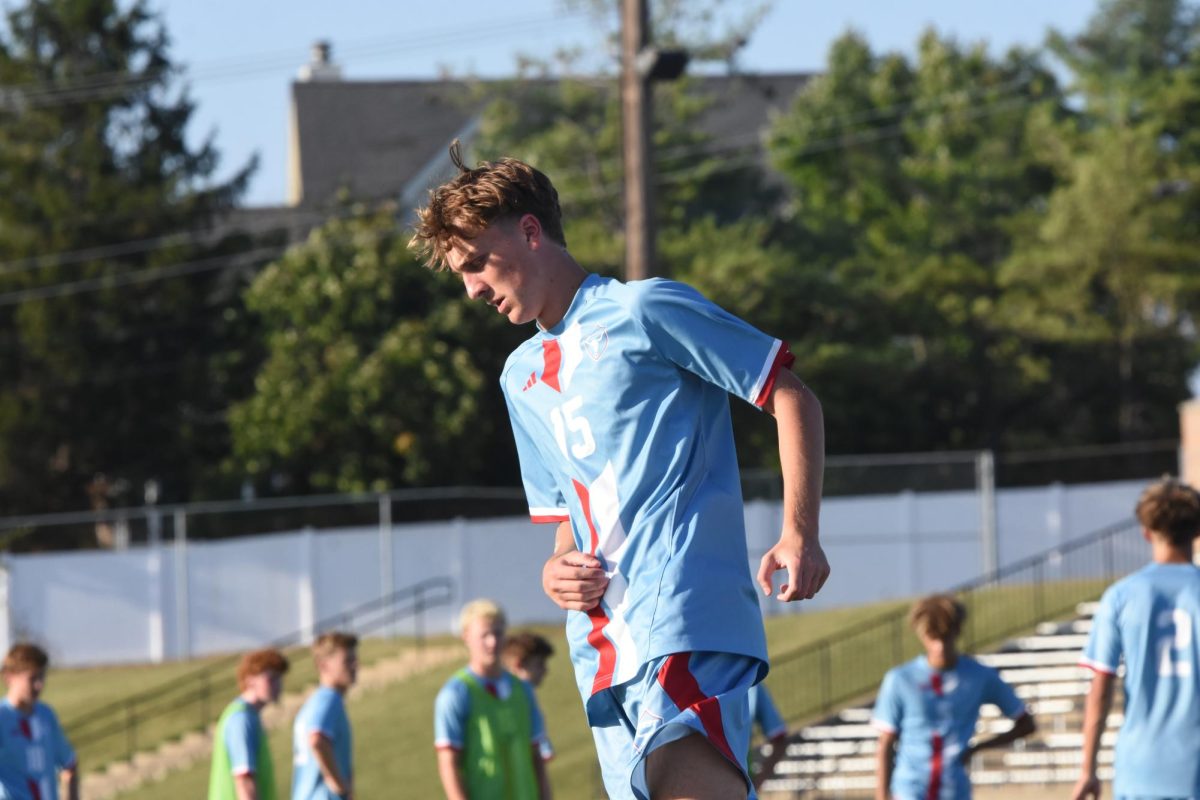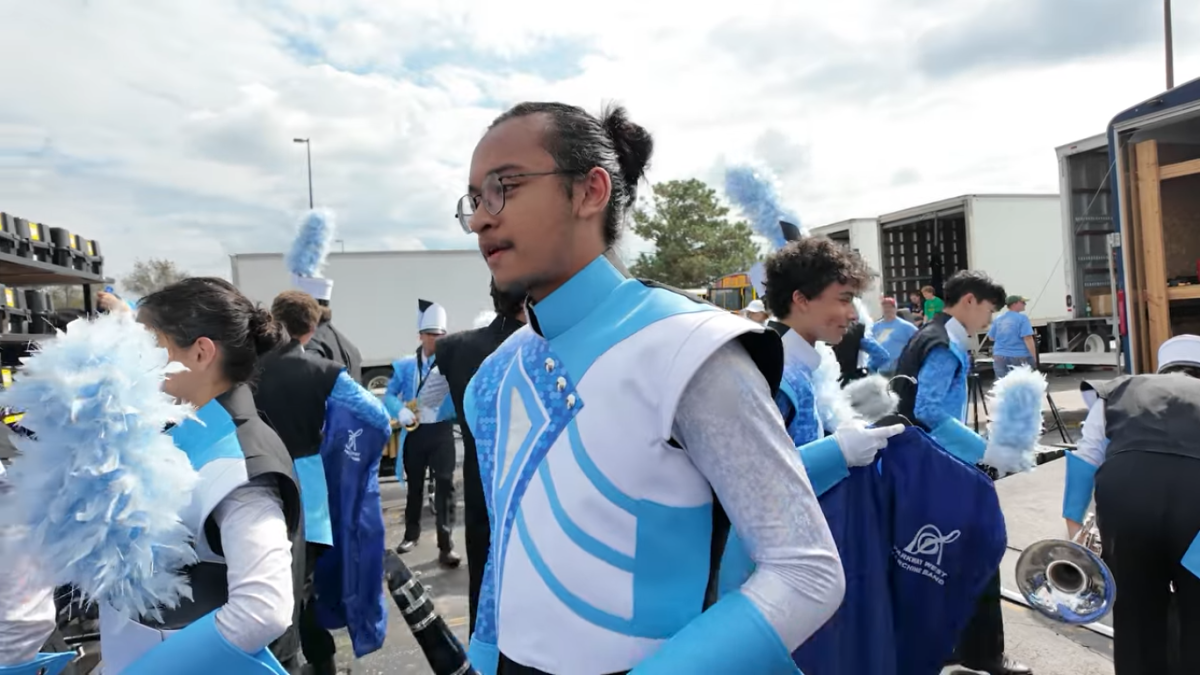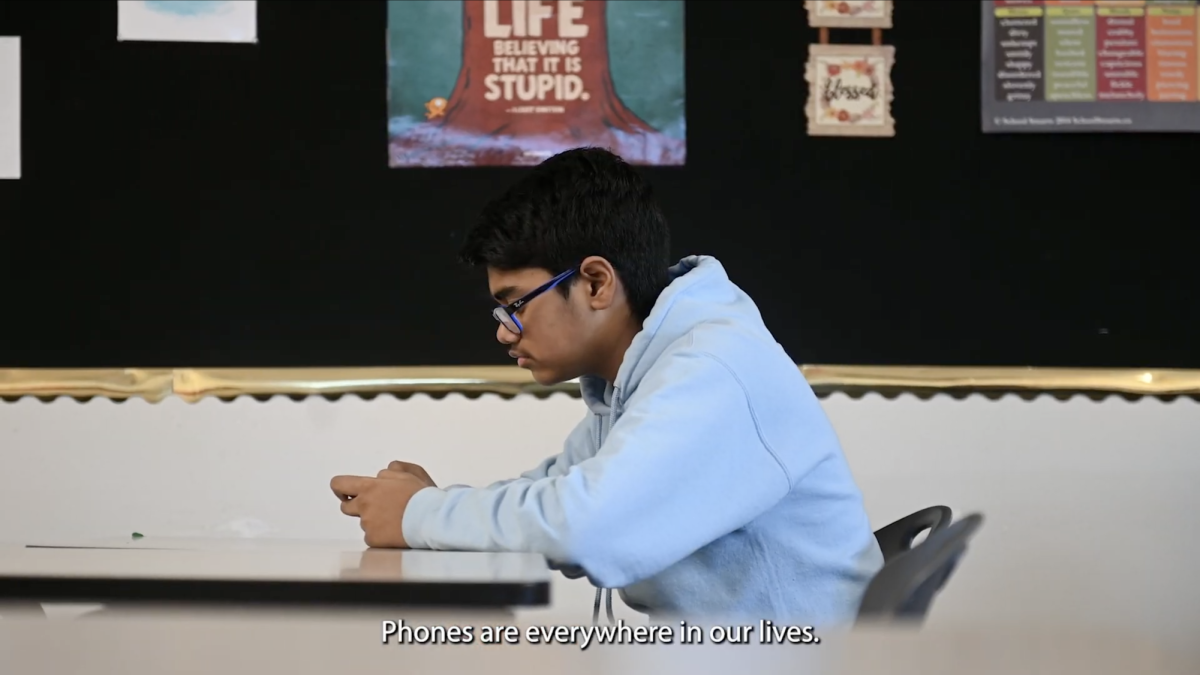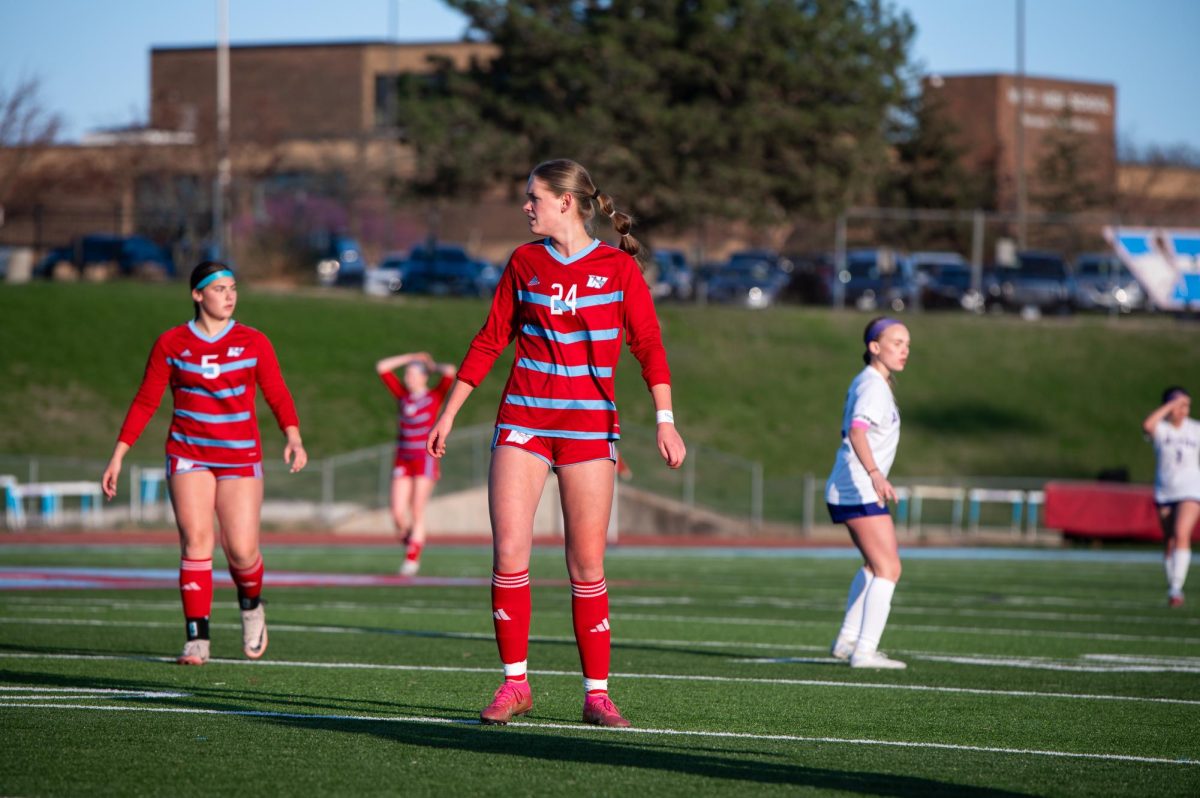FRENCH TEACHER BLAIR HOPKINS: They broke it down into phases to sort of make it easier for us to get used to and the first phase just involves monitoring so we start with monitoring at lunch or monitoring in the halls or keeping an eye on whatever part of the building has an activity going on that might need extra people.
0:35
HOPKINS: I love Parkway. This has been my favorite teaching job that I’ve ever had, but the burnout can hit you anywhere. In the school that I came from, teachers would leave after two or three years because of the way that it was structured. The turnover was very, very high. So, it’s always a struggle of, of course, I want to do my job the best I can, but I can’t burn myself out. I can’t be exhausted. I can’t have no personal life. I can’t be working every Saturday. I reached a point where I didn’t make any plans during the week. I would only do things on the weekends because on any given Tuesday, I might have to go lie down on the couch and not get up again for an hour. So I tried not to commit to going anywhere in case I was too tired. It was when I realized that was how I was planning my life [that] I was like “Okay, maybe this particular school is not going to be sustainable long-term.” Being here has been much, much, much better. But definitely, when I heard that they are losing all of this plan time, it did start to make me think “Oh no, oh no, oh no. Please don’t let it become like the place I left because I really want to be here and I really want to be able to do a great job.” I think other teachers have felt that way too.
2:02
ENGLISH TEACHER MICHELLE KERPASH: I really can’t imagine [this situation] because when I came to Parkway and [former Deputy Superintendent] Desi Kirchhofer — he was the deputy superintendent of secondary [education] — and Beth Plunkett interviewed me, the philosophy of Parkway was very simple and very solid: we hire the best and only the best, [then] we get out of their way and we let them teach. And they did. And it’s been amazing for 15 years. This to me is a mark of lack of trust in teachers. If you’ve hired us and you’ve hired the best and you know we’re the best, then you have to trust us to self-manage and self-supervise. Every single adult in this building is here for kids — that controls every decision we make — what’s best for kids. This decision does not align with what’s best for kids in my mind. What’s best for kids is having teachers that are fully planned, fully prepared, can individualize [and] can differentiate to help kids get caught up. That’s what’s best for kids. Having teachers sacrifice 90 minutes a week to patrol hallways is not benefitting your education.
KERPASH: In order to grow and improve in writing, you have to write multiple drafts. You have to have teacher feedback on that writing and then you have to do something with it. It’s not enough to just get a paper back from a teacher that has a grade and feedback because that feedback doesn’t go anywhere other than the recycle bin. For you to improve as a writer you need to submit a draft, get teacher feedback, make revisions and maybe [revise] yet another time. That can’t just happen on one paper. It has to happen on multiple types of writing over the course of a semester. So, with freshmen that means if we have a novel study and we’re reading a book, there might be three different paragraphs. Even just paragraphs are written and revised and revised before one is ever graded. That level of intensity of feedback — that is teaching. The teaching is the teacher providing the feedback individually. Some things can be done on the Smart Board as a lesson for the whole class, but so much is individualized. What Parkway has been advocating is differentiated instruction. Parkway has been encouraging us very strongly to meet each learner where they are and advance them forward. Not, here’s an abstract goal and hope everyone gets there — because some people are already past it and [for] some people that might not be attainable. So, you have to make leveled improvements and the only way to do that is to have the time to give each student individual and specific feedback — not just ‘good job’ or ‘work on sentence variety.’ You have to be able to tell people, ‘Here try this.’ ‘What if you rephrased it this way?’ And there’s not a canned comment box that will do that for teachers, so we need that time — especially in a writing-heavy course, which is basically anything in this building.
5:05
HOPKINS: I do know several teachers already that are planning to give up something that they sponsor because they anticipate not having enough time and/or in protest of losing plan time to draw that line: if I’m being asked to do these things, then that means I can’t do these other things. That’s definitely happening, and that would directly impact students if they no longer have a sponsor for an activity that they’re involved in. I think it could also impact students in terms of morale. I think you can tell if your teacher is stressed or not [and] if your teacher’s enjoying what they’re doing or not. I would hate to see that change, but from what I’ve seen and what I’ve heard people say, the morale is already taking a hit because teachers feel a little deflated by, well, it’s just hard to see how we’re gonna do everything we need to do in two-thirds the amount of time we used to have.


![Performing as Nibs in “Lost Girl,” junior Avery Hermann inspects a drawing of Neverland made by the show’s main character, Wendy Darling. Hermann not only acted in “Lost Girl”, but he also served as assistant director of the show. “I found ‘Lost Girl’ to be a beautiful and touching story, and I’m really glad I got to be a part of it. My favorite part of the show [was] my work as assistant director. I spent a lot of time working with every [cast member] on character, deliveries and emotional development. It was so amazing to see these brilliant actors come to life on stage in such a colorful way,” Hermann said.](https://pwestpathfinder.com/wp-content/uploads/2025/11/DSC_1258-Enhanced-NR-1-1200x798.jpg)



![Standing in front of the camera and next to Fox 2 News' Ty Hawkins, senior and varsity football player JaMont Brooks represents the varsity football team. As captain and outside linebacker, Brooks was one of four students selected to be interviewed live for the broadcast. “Overall, it was just a crazy experience being on the news. Even when I get older, I’ll tell my kids or grandkids I was on the news. My mom sent me a picture of me on the news [saying] ‘Oh my gosh, that’s my son.’ The Parkway West community felt amazing this morning. Everybody showed up at 6 [a.m.] and [will] show up 6 [p.m.] tonight too. Any time I go into a game, I go up there with the mentality that we’re going to try our best, and even the times we struggle, [I’ll] keep my head up,” Brooks said.](https://pwestpathfinder.com/wp-content/uploads/2025/10/DSC8122-Enhanced-NR-1200x799.jpg)

![Blue lights shining brightly, senior Riley Creely beatboxes into the microphone. Creely and the group began the performance in front of the blue lights, sparking interest from the audience. “The pep rally performance was fun. I got to beatbox for the first half of the song, which was hype. I liked to look into the student section [while I performed],” Creely said.](https://pwestpathfinder.com/wp-content/uploads/2025/09/DSC_5085-Enhanced-NR-1200x799.jpg)

![Leaping through the air, senior Tyler Watts celebrates his first goal of the season, which put the Longhorns up 1-0 against the Lafayette Lancers. Watts decided to play soccer for West for his last year of high school and secured a spot on the varsity roster. “[Playing soccer for West] is something I had always dreamed of, but hadn’t really had a good opportunity to do until now. It’s [really] fun being out [on the field], and I’m glad I decided to join the team. It’s just all about having fun with the boys and enjoying what time we have left together,” Watts said.](https://pwestpathfinder.com/wp-content/uploads/2025/09/DSC_1951-1200x855.jpg)
![Sophomore Natalie House pitches the ball during an intrasquad scrimmage for Red and Blue Night on Aug. 22. House played catcher for the varsity softball team. “I started [playing] softball when I was five. My brother played baseball, and I wanted to start sports like him. Scrimmaging against our own team is always kind of difficult because we all know each other's [weaknesses],” House said.](https://pwestpathfinder.com/wp-content/uploads/2025/09/DSC7191-1-1-1200x844.jpg)

![Sophomore Shree Sikkal Kumar serves the ball across the court in a match against Lindbergh. Sikkal Kumar has been a varsity member of the varsity girls’ tennis team for two years, helping her earn the number two rank in Class 2 District 2.“When matches are close, it’s easy to get nervous, but I [ground] myself by[staying] confident and ready to play,” Sikkal Kumar said.](https://pwestpathfinder.com/wp-content/uploads/2025/11/DSC2801-1200x798.jpg)
![Dressed up as the varsity girls’ tennis coach Katelyn Arenos, senior Kate Johnson and junior Mireya David hand out candy at West High’s annual trunk or treat event. This year, the trunk or treat was moved inside as a result of adverse weather. “As a senior, I care less about Halloween now. Teachers will bring their kids and families [to West’s Trunk or Treat], but there were fewer [this year] because they just thought it was canceled [due to the] rain. [With] Halloween, I think you care less the older you get,” Johnson said.](https://pwestpathfinder.com/wp-content/uploads/2025/10/DSC00892-1-1200x800.jpg)
![Focused on providing exceptional service, sophomore Darsh Mahapatra carefully cleans the door of a customer’s car. Mahapatra has always believed his customers deserve nothing less than the best. “[If] they’re trusting us with their car and our service, then I am convinced that they deserve our 100 percent effort and beyond,” Mahapatra said.](https://pwestpathfinder.com/wp-content/uploads/2025/10/DSC_0018-1200x800.jpg)
![Sophomore Aleix Pi de Cabanyes Navarro (left) finishes up a soccer game while junior Ava Muench (right) warms up for cross country practice. The two came to Parkway West High School as exchange students for the 2025-2026 school year. “The goal for the [exchange] program is to provide opportunities for both Parkway students and our international exchange students to learn about other cultures, build connections and become confident, capable, curious and caring — Parkway’s Four C’s — in the process,” Exchange Program Lead Lauren Farrelly said.](https://pwestpathfinder.com/wp-content/uploads/2025/10/Feature-Photo-1200x800.png)
![Leaning on the podium, superintendent Melissa Schneider speaks to Parkway journalism students during a press conference. Schneider joined Parkway in July after working in the Thompson School District in Colorado. “My plan [to bond with students] is to get things on my calendar as much as possible. For example, being in [classes] is very special to me. I am trying to be opportunistic [meeting] kids [and] being in [the school] buildings. I have all the sports schedules and the fine arts schedules on my calendar, so that when I'm available, I can get to them,” Schneider said.](https://pwestpathfinder.com/wp-content/uploads/2025/09/IMG_5425-1200x943.jpeg)
![Gazing across the stage, sophomore Alexis Monteleone performs in the school theater. The Monteleone family’s band “Monte and the Machine” has been releasing music since 2012, but Alexis started her own solo career in 2024 with the release of her first single, Crying Skies. “My whole family is very musical, [and I especially] love writing [songs with them],” Monteleone said.](https://pwestpathfinder.com/wp-content/uploads/2025/09/DSC7463-1200x798.jpg)


![Shifting global trade, President Donald Trump’s tariffs are raising concerns about economic stability for the U.S. and other countries alike. “[The tariffs are] going to pose a distinct challenge to the U.S. economy and a challenge to the global economy on the whole because it's going to greatly upset who trades with who and where resources and products are going to come from,” social studies teacher Melvin Trotier said.](https://pwestpathfinder.com/wp-content/uploads/2025/05/MDB_3456-1200x800.jpg)
![Helping a customer, print room assistant Gretchen Williams operates her booth at the West High Craft Fair from Oct. 25-26. This was Williams’ first time participating in the Craft Fair with her new craft shop, Gs Beaded Boutique. “People have always said, over the years, ‘you should open something.’ [I replied that] I would rather just make [my crafts as] gifts for people. I just started [the online store] up, and it's been okay. I'm always surprised [by] how many views I get and [the] people from different states buying things; somebody from Alaska bought something the other day.”](https://pwestpathfinder.com/wp-content/uploads/2025/11/DSC0451-2-1200x799.jpg)
![Between lights, smoke and a captive audience of students, science teacher Joel Anderson conducts his annual Halloween show in class on Oct. 31. Anderson has performed the Halloween show every year for 27 years, since he started teaching in 1999. “[My favorite part about the show] is getting students excited about it and seeing their level of anticipation. After the students see it, they realize that [I] put a lot of time and effort into it,” Anderson said. “They also end up learning because I sneak some chemistry into the [show] as well. So, it’s a whole bunch wrapped up in a 15 or 20-minute package. It’s really scary.”](https://pwestpathfinder.com/wp-content/uploads/2025/11/DSC_9047-Enhanced-NR-1200x798.jpg)

![Smiling in a sea of Longhorns, Fox 2 reporter Ty Hawkins joins junior Darren Young during the morning Oct. 3 pep rally. The last time West was featured in this segment was 2011. “[I hope people see this and think] if you come to [Parkway] West, you will have the time of your life because there are so many fun activities to do that make it feel like you belong here. I was surprised so many people attended, but it was a lot of fun,” Young said.](https://pwestpathfinder.com/wp-content/uploads/2025/10/Edited2-1200x798.jpg)

![Hugging senior Ella Wheeler, senior Jamaya Love beams after scoring a touchdown at the Powderpuff football game on Sept. 11, putting the seniors on the scoreboard with a score of 6-2 above the juniors. The seniors went on to capture the victory with a final score of 12-2. “I was actually gassed [at this moment]. I was so tired. But, everyone on the sideline, all my teammates and everybody in the stands were cheering,” Love said.](https://pwestpathfinder.com/wp-content/uploads/2025/09/DSC1735-Enhanced-NR-2-1200x799.jpg)
![Raising her hands in the air, freshman Jillian Sternhagen follows Mr. Mooney’s lead during an activity Aug. 15 at freshman orientation. Surrounded by other freshmen, Sternhagen learned an “A O E day” chant to help remember their new weekly high school schedule. Students participated in several activities to get to know each other, the school and the upperclassmen. “We got to tour the school and learn where everything in our schedule is. The energy [at orientation] was fun; the leaders were peppy and got us excited,” Sternhagen said.](https://pwestpathfinder.com/wp-content/uploads/2025/08/DSC_0145-1200x798.jpg)


![“I started playing [basketball] because I saw that my brothers were playing, and I found it fun; I started playing at age eight and have continued to play ever since. [Something] I enjoy [is] the back-and-forth competitiveness of basketball that I don't get when I play softball, as well as our team bonding activities because I think it helps with the chemistry throughout our group and in the real world. I also enjoy winning and all of the competitive aspects. [Basketball] has brought great memories and people into my life, and I enjoy spending most of my time with them and cherish the memories my team has created. Getting to go out and play with my very best friends every day is just the best gift a girl can get. A big thing that motivates me is how much time and effort my coaches put in. I just want to work hard because they work hard, while also making my parents proud at the same time. Sometimes, it’s not an easy task being able to balance school and athletics, but with the right mindset and focusing on the goals that I have set for myself, it’s achievable. In high-pressure situations, I just go back to playing my own game [and the basics within the game] rather than focusing on everything around me because I trust my training and my practice. [My advice for upcoming players] is to keep going and continue to practice. Nobody is perfect, there is always going to be something to improve or get better at. There is always going to be someone out there who is doing better than you, and if you want to be the best, you have to keep going and push yourself to be better, but most importantly just have fun in what you’re doing.” - Siena Snyder, 12](https://pwestpathfinder.com/wp-content/uploads/2025/03/DSC0571-Enhanced-NR-Ella-McNeal-1-1-1200x798.jpg)
